 PautaInternas
PautaInternas
 buscador
buscador
 Web Content Viewer
Web Content Viewer
Circular Economy Initiatives
Jun 28, 2024
The most representative circular initiatives

Clarification solids
At Ecopetrol, clarification solids are solid waste generated during the treatment and clarification processes of water used in industrial operations. These solids come primarily from the removal of impurities and sediments from captured surface water, which are dewatered using GeoTube®. These clarification solids can be used as raw material for land redesign and civil improvements such as paving stones, slabs, eco blocks, posts, among others.
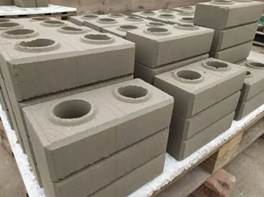
Phytoevaporators at Cenit stations
This is an alternative technology for managing treated domestic wastewater effluent. It mimics the natural water purification process that occurs in natural wetlands, allowing for the reduction or elimination of discharges. This artificial wetland system is designed to allow all effluent to be released into the atmosphere through evapotranspiration, thus eliminating domestic wastewater discharges and eliminating nutrients through harvested biomass and microorganisms. This design allows for the fulfillment of various objectives, such as the elimination of contaminants and/or the reduction of organic load.
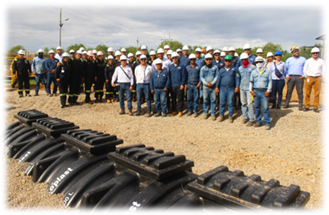
Modified asphalt with ISA Coastal Route
Ruta Costera, a concessionaire of ISA Vías, began installing asphalt with recycled plastic for the maintenance of the Fourth Generation Cartagena-Barranquilla and Circunvalar de la Prosperidad road corridor. The road will have 40 kilometers of single-lane roadway, using 675 tons of recycled plastic (equivalent to more than 11 million plastic bags). With this project, Ruta Costera marks a milestone as the first 4G road project in Colombia to apply this innovative mixture, which also represents a significant advance in plastic waste management.

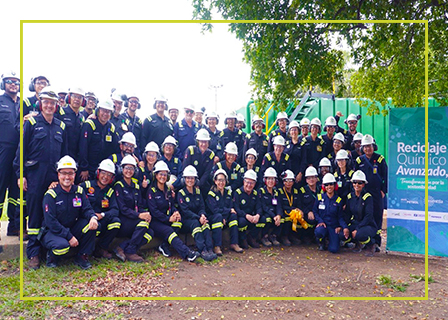 1. Advanced Chemical Recycling
1. Advanced Chemical Recycling
First stage of the chemical recycling project in alliance with Esenttia, Barrancabermeja Refinery, PepsiCo and other companies, incorporating pyrolytic oil into the refinery from the recovery of ~ 500 tons of plastic waste disposed in landfills to produce circular polypropylene for food packaging.
More information: Chemical recycling project in partnership with Esenttia.
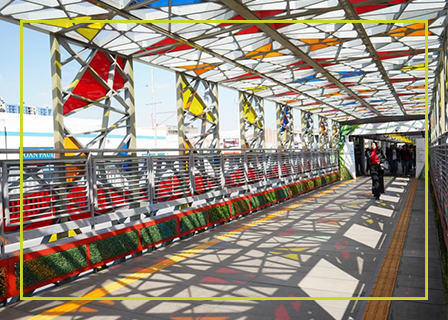 2. Transmilenio Sustainable Station
2. Transmilenio Sustainable Station
Ecopetrol participated in the planning and construction of the first sustainable Transmilenio station. This station is known as Ricaurte and the construction required: 19 tons of recycled plastic, which is equivalent to approximately 2.7 million plastic bags and 32 solar panels that generate 25,537 kilowatt hours per year.
More information: First environmental station in Transmilenio.
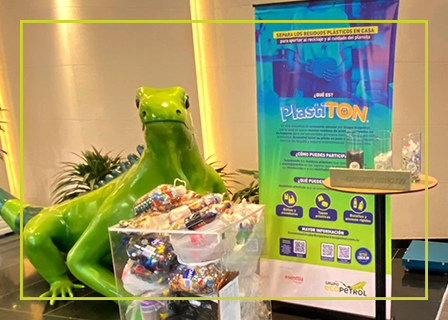 3. PlastiTON Iniciative
3. PlastiTON Iniciative
The PlastiTON initiative was launched in 2022 and its acceptance has been exponential. In total, in 2023 there is 3 locations in Bogota and more than 1.5 tons of usable material was recovered.
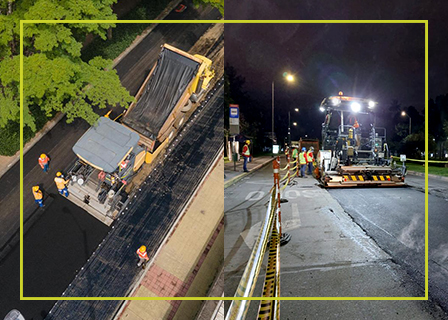 1. Modified asphalt
1. Modified asphalt
In 2022 two prototypes for urban roads adequacy with modified asphalt were launched. One of them in Bogota near to El Dorado International Airport where 125 thousand plastic bags were used closing the plastic loop. The second prototype used 200 thousand plastic caps in La Alpujarra, Medellín. The plastics compounds increase the mechanical conditions for the asphalt and its maintenance decreases.
 2. Ecopetrol’s and ACP agreement
2. Ecopetrol’s and ACP agreement
In 2022 the agreement between Ecopetrol S.A. And the Colombian Oil Association (ACP in Spanish) was executed. This agreement generated 2 business models for construction and demolition wastes, water clarification treatment wastes and water-based cuts reuse in Mid Magdalena region.
More information: Alternative business models.
 3. PlastiTON Iniciative
3. PlastiTON Iniciative
The PlastiTON initiative was launched in 2022 focusing on recycling plastic material generated by employees and their families. This program is supported by Esenttia and Botellas de Amor Foundation.
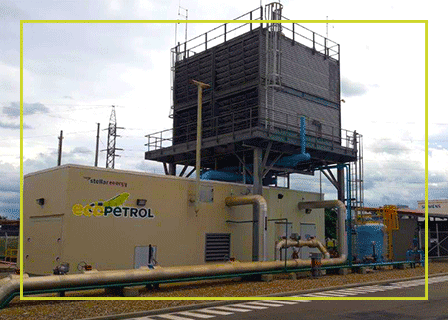 1. Production water reuse in Termosulia - Apiay Camp - VRO
1. Production water reuse in Termosulia - Apiay Camp - VRO
The shedding and catchment were decrease due to water barrels use (average: 36.65 water barrels/month) increasing 5% the electric generation process efficiency. Also, the air temperature decreases in combustion processes used in turbines produced a significant reduction of 170,82 thousand CO2 tons in 10 years.
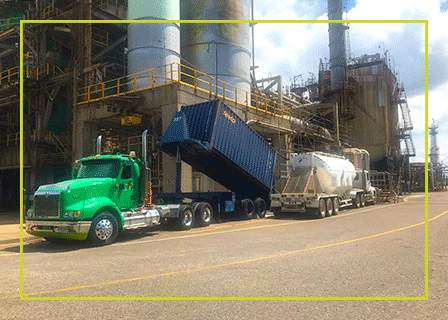 2. Used catalyst Lifetime increase in catalytic breaking units GRB – VRP
2. Used catalyst Lifetime increase in catalytic breaking units GRB – VRPS625 used catalysts tons were reused in catalytic broker units, increasing their useful time, and generating 1.7 COP milliards in savings related with new catalysts buy.
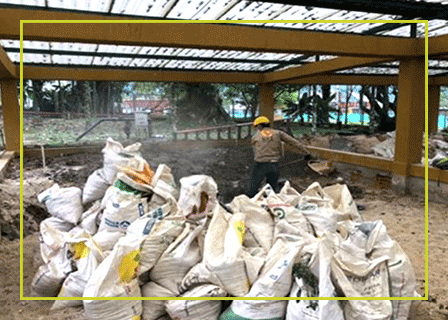 3. Dehydrated sludges use from wastewater treatment plants · IC
3. Dehydrated sludges use from wastewater treatment plants · IC
36 dehydrated Sludge tons were used in industrial wastewater and domestic water treatment plants as complementary material for fertilizers used for inner gardening, generating 90 million COP in savings in 2021 avoiding new fertilizer buys and final sludge disposal.
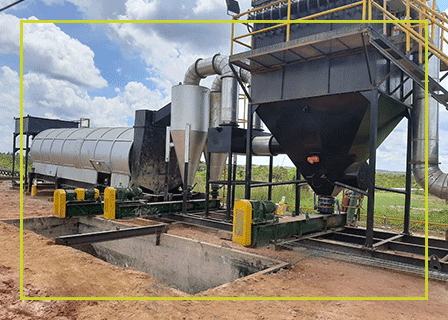 4. Dry water base cuts from drilling processes - Projects and Drilling Vice-precidency · EPP
4. Dry water base cuts from drilling processes - Projects and Drilling Vice-precidency · EPP
Direct flame technology was applied to drilling cuts producing a highly dehydration (50%) and a volume reduction close to 75%. This process permits the cuts reuse to recover eroded zones or actual revegetation process zones, producing a native resource use diminution and significant CO2 emissions reduction due to less frequent cuts transportation.
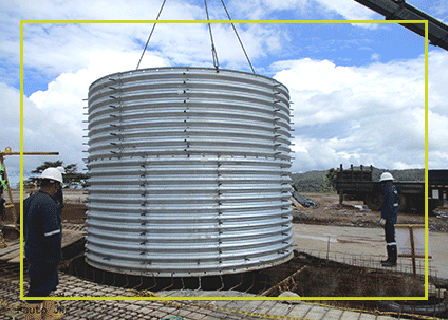 5. Sustainable alternatives for civil projects - Projects and Drilling Vice-precidency · EPP
5. Sustainable alternatives for civil projects - Projects and Drilling Vice-precidency · EPPConcrete use reduction from design project stage permitting a clear material substitution like metals and polypropylene, reducing CO2 emissions reduction of 40% due to concrete carbon print is higher compared with other types of substitute materials.
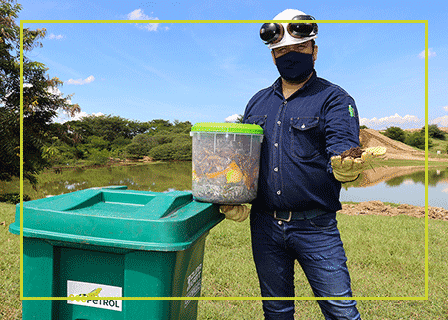 6. Feeding circularity - Supply and services Vice-precidency · VAB
6. Feeding circularity - Supply and services Vice-precidency · VAB
In 17 areas with 40 food courts around the country and 8 contracts were feeding around 2,7 million people between January and September 2021, which generates 936 wastes tons. This initiative Grows circular initiatives, and achieved 83% wastes reuse (779 wastes ton) through composting, vermiculture and new analytic food production models.
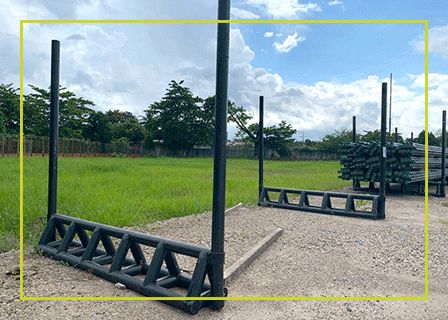 7. Ferrous wastes circularity as raw material for Ecopetrol’s acquired assets - Supply and services Vice-precidency · VAB
7. Ferrous wastes circularity as raw material for Ecopetrol’s acquired assets - Supply and services Vice-precidency · VAB
Ecopetrol generated almost 16 thousand ferrous tons/year which were transported to iron and steel industry for final disposal. Sin 2020, Ecopetrol identified new reuse opportunity for this residues focused on H structures fabrication (racks) replacing a new buy of this structures to third parties, saving 20% of recycle materials according with the market.
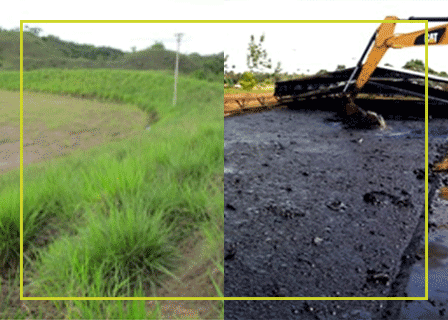 8. Solid wastes treatment for in situ bioremediation in Jaguar Camp, Caracara · Operator: CEPSA COLOMBIA S.A. · Assets with partners Vice-precidency · VAS
8. Solid wastes treatment for in situ bioremediation in Jaguar Camp, Caracara · Operator: CEPSA COLOMBIA S.A. · Assets with partners Vice-precidency · VAS
Bio stimulation and bioaugmentation processes were stimulated using exogenous bacteria, reducing 90% fats and oils. For 6 years Ecopetrol were treated almost 12.000 m3 of oil sludge in camp, generating 1.53 million dollars in savings from treatment costs and transportation to externals allies.
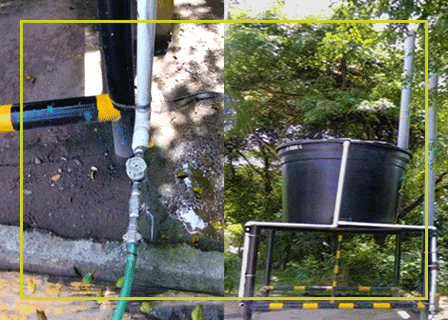 9. Rainwater harvest systems and reuse in Palagua camp · Operator: UT IJP · Assets with partners Vice-precidency · VAS
9. Rainwater harvest systems and reuse in Palagua camp · Operator: UT IJP · Assets with partners Vice-precidency · VAS
A harvest rainwater system was implemented in the 365 Palagua landfarming camp area, producing a daily consumption of 40 m3 which represents a 20% diminution of the whole water use and a 5% reduction in water catchment from deep wells for camp operations.
 10. Organic fertilizer from vegetable wastes in El Retiro Station · CENIT
10. Organic fertilizer from vegetable wastes in El Retiro Station · CENIT
In El Retiro station was executed a composting project constructed with reused materials located in the junk yard. The organic material comes from agro-industrial activities like rice crop, fruit trees, etc. Once the compost was formed, it is used in the same trees and plants located in the station.
More information:
. . .